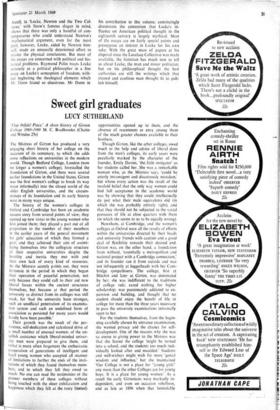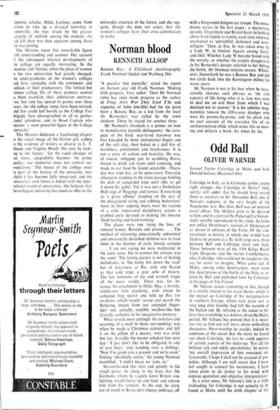Sweet girl graduates
LUCY SUTHERLAND
The Mistress of Girton has produced a very engaging short history of her college on the
occasion of its centenary, to which she adds some reflections on universities in the modern world. Though -Bedford College, London (now
no longer a women's college), forestalled the foundation of Girton,- and there were several earlier foundations in the United States, Girton was the first women's college to break its way (even infortnally) into the closed world of the older English universities, and the circum- stances of its foundation and its early history were in many ways unique.
The -history of the women's colleges in Oxford and Cambridge has been an academic success story from several points of view; they opened up new vistas to the young women who first joined them; they played a part out of all proportion to the number of their members in the earlier years of the general movement for girls' education of which they formed a part; and they achieved their aim of assimi- lating themselves into the collegiate structure of their respective universities despite the hostility and inertia they met with and their own lack of every kind of resources. As the Mistress acutely points out, they were fortunate in the period in which they began their operation of peaceful penetration, not only because they could call to their aid new liberal forces within the ancient structures themselves, but because at that period the university as distinct from its colleges- was still weak, for 'had the university been strongers, such an- unofficial penetration of its examina- tion system and such an undefined form of association as persisted for many years Would hardly have been possible.'
Their growth was the result of the per- sistence, -self-dedication and calculated drive of a small number of unusual women; of the un- selfish assistance which liberal-minded univer- sity men were prepared to give them, and (what is more often forgotten) the enthusiastic cooperation of generations of intelligent and loyal young women who accepted all manner of }imitations to further the ends of the insti- tutions of which they found themselves mem- bers, and to which they felt they- owed so much. No one can read the testimonies of the pioneer members of these colleges without being touched with the sheer exhilaration and happiness which they felt at the (very limited) opportunities opened up to them, and the absence of resentment or envy among them of the much greater chances available to their brothers.
Though Girton, like the other colleges, owed much to the help and advice of liberal dons from the men's colleges, its early years were peculiarly marked by the character of the founder, Emily Davies, `theJittle instigator' as her students called her. She was a remarkable woman who, as the Mistress says, 'could be utterly intransigent and disastrously mistaken,' blit whose every action was the result of the twofold belief. that the only way women could find full acceptance in the academic world was by showing that they could intellectually do just what their male equivalents did (in which she was probably entirely right), and that they should not be subjected to the social • pressures of life at close quarters with them (in which she seems to us to be equally wrong).
Newnham, at Cambridge, and the women's colleges at Oxford were all the results of efforts within the universities directed by their heads and university friends with caution and a good deal of flexibility towards their desired end. Girton was, on the other- hand, a foundation from without, 'essentially a metropolitan and national project with a Cambridge connection,' and its founder ran it from outside and was not infrequently at loggerheads with her Cam- bridge sympathisers. The college, first at Hitchin and. later at Girton, was dominated by her; she was indifferent to the traditions of college rule; cared nothing for higher scholarship; -was passionately addicted to ex- pansion and building, and thought that no student should enjoy the benefit of life in college for more than the three years necessary to pass the university examinations informally open to her.
For the -students themselves, from the begin- ning carefully chosen by entrance examination, she wanted privacy and the _chance for self- development. One of the reasons why she was so averse to giving power to the Mistress was that she feared the college 'might be turned into a school, and the students too much indi- vidually looked after and moulded.' Students and well-wishers might wish for more 'genial wisdom and influence,' but she maintained 'Our College is not a place for "young girls" any more than the other Colleges are for young boys. It is a place for young women.' As a result the early Girtonians were markedly in- dependent, and even on occasion rebellious, and as late as 18% when that formidable [omeric scholar, Hilda Lorimer, came from iirton to take up a classical tutorship at omerville, she was struck by the greater taturity of outlook among the students she ,ad left than was then apparent among those he was joining.
The Mistress treats this remarkable figure • .(ith understanding and acumen. Her account 'f the subsequent internal developments of lie college are equally interesting. In the twenties and 'thirties, when the place of women n the two universities had greatly changed, he undergraduates of the women's colleges tad little sympathy with the sentiments and Autlook of their predecessors. The limited but ntense college life of these pioneers seemed :o them mawkish, their athleticism unattrac- ive; but time has spread its patina over these years, the old college songs have been revived, tad few could feel hostile to the College Fire 3rigade, here photographed in all its proles- donel splendour, and its Head Captain who iecame 'a most powerful figure in the College tierarchy.'
The Mistress dedicates a fascinating chapter :o the social image of the Girton girl, calling .n the evidence of writers as diverse as L. T. Vfeede and Virginia Woolf. She ends by look- ng to the future: 'for the rapid changes of our times, adaptability becomes the prime 4uality; our memories must not control our predictions.' The future of the college must )e part of the history of the university into vhich it has become fully integrated, and the tniversity's own future is linked with the inter- tational world of universities. She believes that he collegiate university has much to offer to the
university structure of the future, and she sug- gests, though she does not assert, that the women's colleges have their own contribution to make.











































 Previous page
Previous page